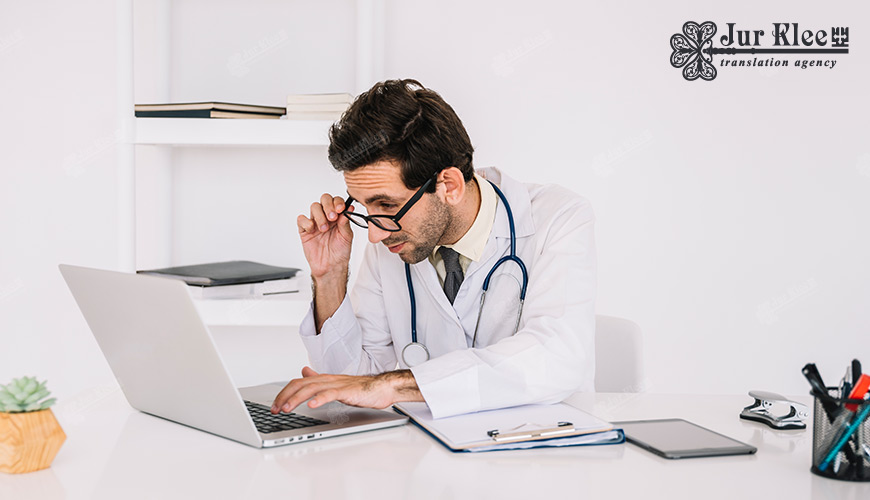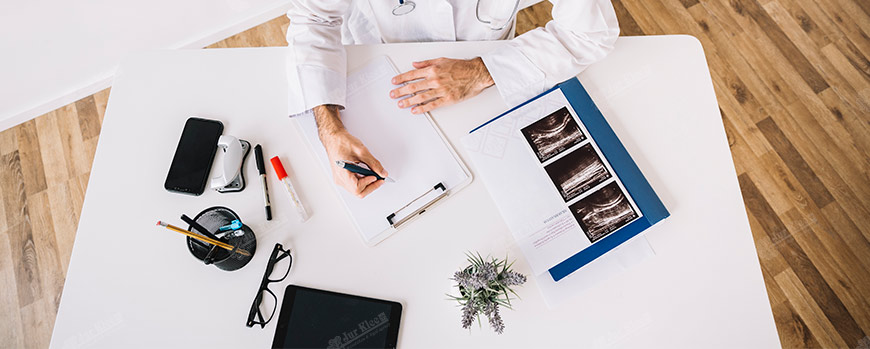
Difficulties of medical translations into German
The development of international contacts leads to an increase in requests for qualified medical care provided by German doctors. There is also growing cooperation between business structures, whose sphere of activity is related to medicine and pharmaceuticals. As a result, the translation of medical documents from Russian to German is increasingly in demand. However, in order to get a document that fully reflects the content of the source, it is not enough just to know the language. The translator is required both to be able to understand the specialization, and to know the features that complicate the task.
When you need a medical translation into German
Germany is one of the world leaders in the provision of medical services. In addition, German-speaking countries include Switzerland and Austria. Germany and Austria occupy top two positions in Europe in terms of health financing. Anyone interested in medical tourism to these countries will also need a medical translation from Russian to German. Clinics in German-speaking countries accept documents written only in German. The conclusions of doctors, the results of tests, the descriptions of the performed procedures - all this requires a narrow specialization from the translator.
Germany is also a leader in the production of pharmaceutical products supplied to Ukraine. Medical translations from German are required for importers of new drugs.
Another area that is in demand among Ukrainian importers is the translation of medical descriptions of equipment and technical devices from German to Russian. Each device is necessarily provided with an extensive instruction manual. The assembly of equipment and its proper use is impossible without an accurate detailed translation. In this case, the services of the translator with experience in medical engineering are required.
Translation of medical documents into German - general features
Medical translation from German into Russian, as well as translations from other languages, is a highly specialized type of work that requires from translators not only to have an excellent command of the language, but also to know special terminology, as well as to take into account the nuances of its application in the practice of a particular country.
Modern medicine is characterized by an increase in narrow specializations, the formation of new treatment options, the development of specialized materials and equipment. This also increases the requirements for specialists who translate into German. Only personnel with specific knowledge may be involved in the translation of documents related to medicine, pharmaceuticals, or medical equipment. The special significance of such translations is that it is directly related to the health and life of people.

Such features as medical acronyms and abbreviations, and specialized terminology also complicate the work. Often, medical translation into German from Russian or vice versa requires an understanding of illegible handwritten text.
The translation of medical documents into German is also complicated due to the constant replenishment of the medical vocabulary with new names or changes in the meaning of previously used terms and expressions. New methods of treatment and diagnosis also expand the medical lexicon. In specialized fields such as oncology, X-ray radiography, radiology, and immunology, vocabulary changes most rapidly. The impact of the COVID-19 pandemic has led to the formation of completely new words and phrases used in virology.
Another point that complicates the translation of medical documents from Russian to German is related to the practice of patient care. Medical histories, protocols of operations, extracts, epicrisis, expert opinions, examination results and other medical documentation are compiled in each country in its own way. In addition, the translation of medical documents from German to Russian should take into account for what purposes and for whom it is performed. If the document is drawn up for the control and licensing authorities, the requirements for it may be reduced. The text intended for attending doctor, on the contrary, should convey the content of the source as accurately as possible, and the translation performed directly for the client should be clear and not have abbreviations or incomprehensible terms.
Latin terms, which are often encountered by specialists who translate from German to Russian, are addressed to doctors and allow them to unambiguously interpret the definitions. In addition to Latin, modern medical texts often contain terms that are borrowed from other languages in an unchanged form. Such situations are increasingly common and are the result of the joint work of multinational teams. In some cases, such cooperation leads to the emergence of specific expressions and terms used in specific institutions.
In addition, another feature that is characteristic of translation from German is the differences in the accepted entries forms and styles that are specific to the country or organization. A specialist working with such documentation should take into account the accepted specifics and have an idea of the details of the design. In such cases, the translator is also required to understand the rules of business documentation.
Medical translation from German to Russian - main difficulties
The peculiarities of the German language are also characteristic of medical texts. Many terms used by German doctors, when translated into Russian, are subject to description. For German, compound long words are generally accepted which in Russian have no analogues and in translation look like a phrase made up of several words. An example is “die Nüchternblutzuckerwerte” – one word that should be translated as “fasting glucose”, or “Fernbehandlungsverbot” – a ban on remote medical care.

Therefore, the translation of medical texts into Russian requires the ability to decompose such complex combinations into components that will not only contain the original meaning, but also be understandable to the reader.
The translator is also required to understand not only German terms, but also borrowings from other languages. Like every science, medicine is becoming more and more international, and medical terms are moving from one language to another. Mostly English-language terms are used (for the German language, this is a common practice not only in medicine, but also in other fields of activity and even in everyday life). Therefore, the translation of medical texts into Russian requires from a specialist to understand foreign language terms. German medical terminology contains a large amount of borrowings from Greek and Latin:
- red vessel - die Arterie in German and arteria in Latin,
- tuberculosis - die Tuberkulose and tuberculosis.
In the special vocabulary of both German and Russian medical languages, international terminology is also used, as well as hybrid phrases that use constructions consisting of a root borrowed from one language and an ending from another. The translation of the medical report into German should take into account the features of such words (examples: percussion, anamnesis, palpation, etc.).
In addition, another feature of medical German is the appearance of abbreviations that are understandable only to specialists.
These are phrases and words like:
- i. v. (intravenous);
- zN (before bedtime);
- Susp. (suspension).
Medical translations into German and into Russian from German cannot contain errors that can lead to very serious consequences. Therefore, the choice of the company that will perform the translation is very important and it is necessary to approach this issue with high responsibility.
